Wrapping up the week!
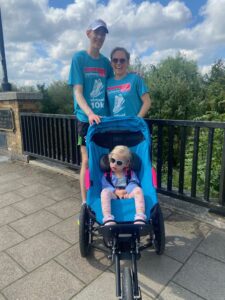 Rounding off National Epilepsy Week, some more Epilepsy Action runners pounded the pavements to raise awareness and money to support people with epilepsy. Hannah, Jack and Annabelle completed their 10k on Saturday morning.
Rounding off National Epilepsy Week, some more Epilepsy Action runners pounded the pavements to raise awareness and money to support people with epilepsy. Hannah, Jack and Annabelle completed their 10k on Saturday morning.
Hannah said: “We ran with our daughter Annabelle, who has Lennox Gastaut syndrome. She really enjoyed being pushed in her new running buggy!”
You can take part in future events for Epilepsy Action – find more information online.
Story champions
Jess Swattridge joined Epilepsy Action deputy chief exec Rebekah Smith on BBC Radio Sheffield to discuss seizures before school exams, living with the uncertainty of seizures, different seizure types and more! (Paulette Edwards – 23/05/2024 – BBC Sounds (1 hour 15 minutes in))
Emma Roy-Williams, another Epilepsy Action story champion, was interviewed on BBC Radio Manchester on Wednesday, speaking about misconceptions, mental health and seizure recovery (Mike Sweeney – 22/05/2024 – BBC Sounds (around 2 hours 24 minutes in)).
On the radio
Epilepsy Action story champion Deirbhile shared her experiences with epilepsy with BBC Radio London (Eddie Nestor – 20/05/2024 – BBC Sounds (from 2 hours 40 minutes in)).
Deputy chief executive Rebekah Smith also spoke to BBC Radio Leeds (Rima Ahmed – Becky Measures sits in (20/05/2024) – BBC Sounds (1 hour 50 minutes in) and BBC Three Counties where she was joined by comedian Sara Aston (Andy Collins – Andy goes to the zoo! – BBC Sounds 1 hour 6 minutes in).
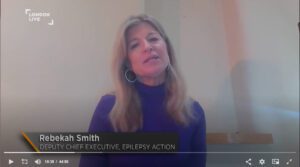
Elsewhere, on TV Rebekah was also on London Live TV (Watch Again: London Live News May 20 – London Live from 10 minutes in)
Beth Dobbin
Olympic sprinter Beth Dobbin spoke to Women’s Health about overcoming the challenges of living with epilepsy to become an athlete. You can read her story here: www.epilepsy.org.uk/press/epilepsy-action-ambassadors. Or read the full article here: Olympic sprinter Beth Dobbin on epilepsy and its traumatic effects (womenshealthmag.com)
Take a leap!
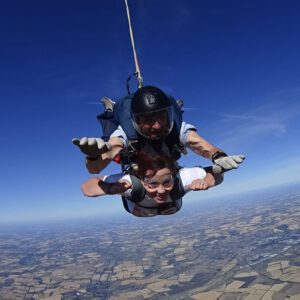 Have you been inspired by the stories you’ve heard this National Epilepsy Week?
Have you been inspired by the stories you’ve heard this National Epilepsy Week?
Join in and do something incredible by booking on to our Jump in July skydiving event!
This exciting fundraising opportunity gives you the chance to experience the thrill of jumping from 10,000 feet and free-falling at more than 100mph in a sponsored tandem skydive with a qualified parachute instructor.
Whether you’re celebrating someone important to you or ticking it off your bucket list, take the leap and help create a world without limits for people with epilepsy.
For more information about how to take part go to: www.epilepsy.org.uk/support-our-work/skydiving/jump-in-july-2024
Epilepsy Action Virtual 10k
This National Epilepsy Week, we are holding a virtual 10k race.
We have runners taking part from all over the world, on a day of their choosing during National Epilepsy Week.
They will earn a shiny medal and a place on our leaderboard.
Three of Epilepsy Action’s speediest team members laced up their trainers on Monday.
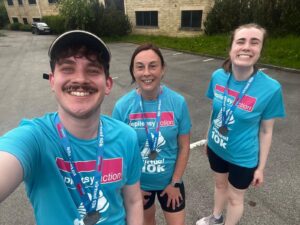
Michael, Jenny and Emma ran together as team King George Southern.
Michael said: “I really enjoyed the 10k, especially as the three of us ran it together – keeping each other motivated the whole time! It was especially lovely to get some unexpected, and much needed, cheering from people who we ran past.”
Jenny added: “The conditions were perfect and we ran faster than I expected. I really enjoyed the experience of running as part of a team.”
Emma said: “It’s been a great thing to aim for over the past few months, as I could really feel the progress from when we started to doing the 10k!”
Epilepsy Action across the BBC
National Epilepsy Week kicked off on Saturday, when deputy chief executive Rebekah Smith and BBC broadcaster Steve Crossman spoke to BBC 5Live about mental health: Saturday Breakfast – 18/05/2024 – BBC Sounds (from 2hr 20mins in).
They were also on the BBC Breakfast sofa, where Professor Tony Marson joined them to talk about issues accessing healthcare and seizure first aid.
23% of public scared to be in a room with someone with epilepsy
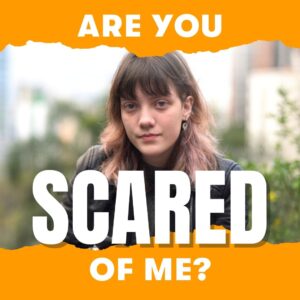 This National Epilepsy Week, Epilepsy Action is asking the public to move past their fear, learn about the condition and find out how they can help.
This National Epilepsy Week, Epilepsy Action is asking the public to move past their fear, learn about the condition and find out how they can help.
A new report by Epilepsy Action, released for National Epilepsy Week (20-26 May) has found that a lot of the public is still “fearful” of epilepsy and seizures. Epilepsy Action says this fear could leave people with epilepsy in “total isolation”.
The data showed that 87% of people with epilepsy reported having mental health issues linked to their condition. Almost a third (29%) said they have faced negative attitudes towards their condition, which affected their mental health.
Meanwhile, a quarter of people in the UK (23%) said they would be scared to be in a room with someone with epilepsy “in case they had a seizure”. A further 24% said this would make them “uncomfortable”.
In the same study, almost one in five (18%) people admitted they would be likely to walk past if they saw a person having a seizure. One in 10 (10%) said their first reaction to seeing someone having a seizure would be to laugh.
Rebekah Smith, deputy chief executive at Epilepsy Action, said: “Fear is an understandable human reaction to something out of our comfort zone. But that doesn’t mean we shouldn’t challenge that fear.
“When it comes to epilepsy, we want the public to understand that the fear they may feel around the condition, or the prospect of seeing a seizure, has very real consequences for people who have it.
“They already face major changes in their life after diagnosis. They have to adjust to a lifelong condition that can affect their work opportunities, their ability to drive and their independence.
“All of these aspects already impact their mental wellbeing, often making them feel lonely, misunderstood and anxious. But feeling as though people are ‘scared’ to be in a room with them ‘in case’ they have a seizure can push people with epilepsy into total isolation.
“People with epilepsy have told us the most important thing we can do to help them feel less alone and improve their mental health is change the attitudes of the public. Get them to learn about epilepsy, and how they can help.
“This is why, this National Epilepsy Week, we’re asking the public to take a small step towards people with epilepsy: look past that initial barrier, and learn what you can do to help instead. Make people with epilepsy feel that they’re not ‘something to be scared of’.”




